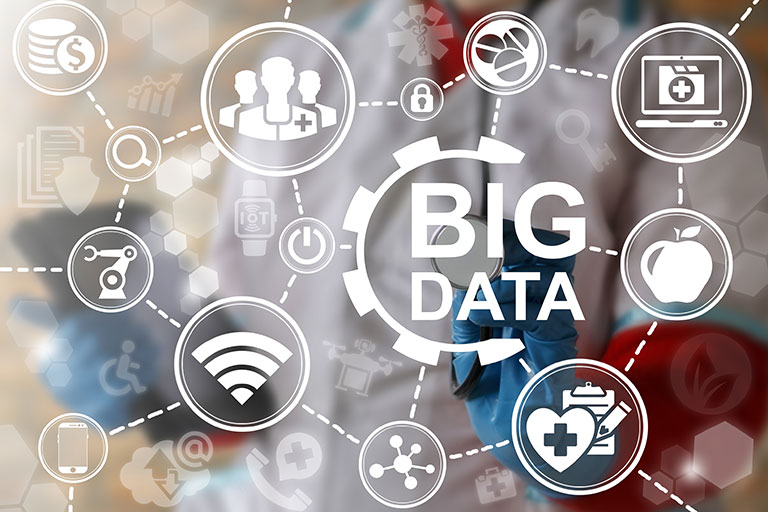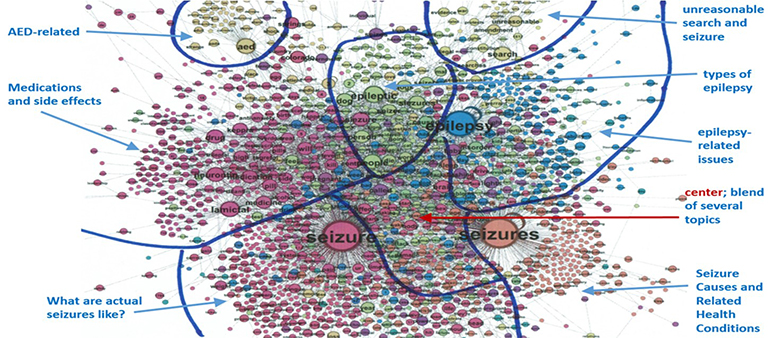As a behavioral researcher who focuses on improving the quality of life of people with epilepsy, it is important for IUPUI’s Wendy Miller to have a thorough understanding of the struggles experienced by patients with chronic disease. To help her capture that true patient voice, she turns to artificial intelligence – particularly big data.
“Big data is an unorganized, extremely large dataset that is very messy in its raw form, such as social media or electronic health records,” said Miller, an associate professor and director of the Social Network Health Research Lab in the IU School of Nursing. “But if we can analyze it in a meaningful way, it can be very, very informative. It gives you that snapshot of what people are really talking about and does so quickly."
Whether they realize it or not, Miller says people around the world are constantly using devices like smart watches or treadmills that collect health data, generating patient-driven data on a second-by-second basis. This type of big data helps researchers like Miller continue to develop interventions that can improve the quality of life for so many.
Miller first became involved with artificial intelligence in 2015 when the School of Nursing was gifted a large data set from Cha Cha, a former search engine that provided real-time answers to questions asked by users. By working with a data analyst, she was able to find the true patient voice in the data, which has made an important impact on her research.
“We discovered that by using this type of data, we can provide truly patient-centered care,” Miller said. “I was able to learn what our patients were most concerned about, things not yet captured in the scientific literature. AI allows me to find that organic, true patient voice, and I have been able to really capture what is important to them and address things that weren’t always addressed. That information is vital in helping me design patient-centered inventions.”
Miller leads the School of Nursing’s Social Network Health Research Lab, where she facilitates research and collaborates with other nurse scientists who want to use AI and big data for their nursing- and health-focused research. She likes to take an interdisciplinary approach to her projects, often collaborating with other researchers at IU who are outside the School of Nursing but are engaged in AI-related work.
For the past four years, Miller has been working with Katy Borner and Luis Rocha of the Luddy School of Informatics, Computing, and Engineering on a grant from the National Library of Medicine to develop an online, personalized platform designed to improve the self-management of people living with chronic disease, specifically epilepsy. This tool will allow patients to curate their own information, while also learning skills to help manage their epilepsy.
Researchers are using PubMed data and social media, as well as data visualizations and data from epileptologists – neurologists with a specific interest in epilepsy – across the country.
“We are leveraging big data created by patients and turning it into something that they can use to improve their health,” Miller said. “This will be an intervention that is very sustainable and scalable. It is all online and can reach anyone with a cell phone. It allows us to improve the self-management behaviors of people in all areas, from all socioeconomic factors and more.”
Miller recently worked with IU’s Kinsey Institute to determine problems with relationships for epilepsy patients. Using data from the Epilepsy Foundation, they found that when people with epilepsy are more satisfied with their intimate relationships, they are also more likely to manage their condition better. They are submitting a grant aimed at developing an intervention to help.
“This is giving us a new way to intervene that we haven’t before to improve the self-management of people with epilepsy,” Miller said. “Most of the time, we try to improve self-management by working on individual characteristics. But for the first time, we are looking at a very specific thing: relationship satisfaction. If it works, and we think it will, it could be used with other chronic diseases too.”
Miller is also using her experience with big data to capture the voices of nurses who have served on the frontlines of the COVID-19 pandemic. As she saw more and more nurses take to social media in spring 2020 to share their personal experiences dealing with the deadly virus, Miller began using machine learning to listen to what they were saying on Twitter, information that can help hospitals better prepare for the next time an outbreak of this magnitude occurs.
She will soon begin work with Margaret Sposato, a PhD student, to embark on a follow-up study using AI and Twitter data to determine how nursing as an occupation was being discussed prior to the COVID-19 pandemic, and they will use historical research to learn how it was talked about during the 1918 flu pandemic.
“In 2020, we found that nursing was being talked about in a way on social networks that it never has before, using military-type terms,” Miller said. “We want to use social media and machine learning to categorize how nursing has changed in the eye of the public, but also to go back 100 years to see if these same types of terms were being used during the 1918 pandemic.”
There is no doubt that AI has played an instrumental role in Miller’s recent research endeavors, and she has no plans to stop using AI and big data anytime soon.
“These important collaborations help us answer big questions using health data, and I see AI as always playing a part in my future work and my students’ work,” Miller said. “I appreciate that AI and risk-taking research is really supported and celebrated at IU, and there are tons of people here who are doing all kinds of cool things.”




